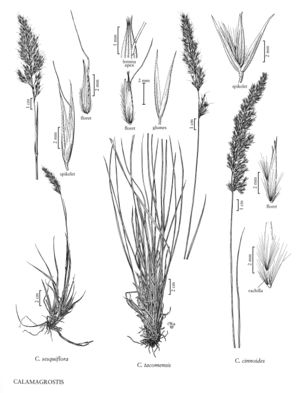Difference between revisions of "Calamagrostis cinnoides"
FNA>Volume Importer |
FNA>Volume Importer |
||
| Line 8: | Line 8: | ||
|name=Calamagrostis coarctata | |name=Calamagrostis coarctata | ||
|authority=unknown | |authority=unknown | ||
| − | }}{{Treatment/ID/Synonym | + | }} {{Treatment/ID/Synonym |
|name=Agrostis glauca | |name=Agrostis glauca | ||
|authority=unknown | |authority=unknown | ||
| Line 22: | Line 22: | ||
-->{{Treatment/Body | -->{{Treatment/Body | ||
| − | |discussion=<p>Calamagrostis cinnoides is found on roadsides, in ditches, pond edges, and boggy streamhead seepages, and along streams in oak or oak-pine woods on sandy to peaty soils, at 5-1100 m. Its range extends throughout eastern North America, from Nova Scotia and Maine to Georgia and Louisiana. It is adventive in Ohio.</p><!-- | + | |discussion=<p><i>Calamagrostis cinnoides</i> is found on roadsides, in ditches, pond edges, and boggy streamhead seepages, and along streams in oak or oak-pine woods on sandy to peaty soils, at 5-1100 m. Its range extends throughout eastern North America, from Nova Scotia and Maine to Georgia and Louisiana. It is adventive in Ohio.</p><!-- |
| − | --><p>Since Arundo canadensis Michx. was cited as a synonym for both Arundo cinnoides Muhl. and Calamagrostis cinnoides, both of these latter combinations are considered to be superfluous—and thus illegitimate—names, even though they differ taxonomically from A. canadensis Michx. A proposal is in preparation to conserve the name C. cinnoides over the less frequently used, but legitimate, combination C. coarctata Eaton.</p> | + | --><p>Since <i>Arundo</i> canadensis Michx. was cited as a synonym for both <i>Arundo</i> cinnoides Muhl. and <i>Calamagrostis cinnoides</i>, both of these latter combinations are considered to be superfluous—and thus illegitimate—names, even though they differ taxonomically from <i>A. canadensis</i> Michx. A proposal is in preparation to conserve the name <i>C. cinnoides</i> over the less frequently used, but legitimate, combination C. coarctata Eaton.</p> |
|tables= | |tables= | ||
|references= | |references= | ||
| Line 43: | Line 43: | ||
|publication year= | |publication year= | ||
|special status= | |special status= | ||
| − | |source xml=https://jpend@bitbucket.org/aafc-mbb/fna-data-curation.git/src/ | + | |source xml=https://jpend@bitbucket.org/aafc-mbb/fna-data-curation.git/src/8f726806613d60c220dc4493de13607dd3150896/coarse_grained_fna_xml/V24/V24_1010.xml |
|subfamily=Poaceae subfam. Pooideae | |subfamily=Poaceae subfam. Pooideae | ||
|tribe=Poaceae tribe Poeae | |tribe=Poaceae tribe Poeae | ||
Revision as of 17:16, 18 September 2019
Plants without sterile culms; loosely cespitose, with rhizomes 2-3 cm long. Culms (60) 80-140(170) cm, often solitary, unbranched, scabrous; nodes 3-5(6). Sheaths smooth or slightly scabrous; collars smooth to densely scabrous; ligules (2)3-4(6) mm, usually truncate, rarely obtuse, usually entire, sometimes lacerate; blades (8)10-35(45) cm long, (3)3.5-7.5(10) mm wide, flat, pale green, smooth or slightly scabrous, adaxial surfaces glabrous or sparsely hairy. Panicles (8)12-20(25) cm long, (0.8)1.5-2.5(3) cm wide, erect, contracted, green to greenish purple; branches (2.5)4-7 cm, sparsely to densely scabrous, some prickles more than 10 times the length of the others, spikelets usually confined to the distal 1/2-1/4. Spikelets 5-7(7.5) mm; rachilla prolongations about (0.5)1(1.5) mm, hairy only distally, hairs 2-4 mm. Glumes keeled, keels slightly scabrous, lateral veins prominent, apices acuminate, sometimes shortly awned; callus hairs 3-4 mm, 0.5-0.7 times as long as the lemmas, abundant; lemmas 4.5-5.5 mm, 1-2 mm shorter than the glumes; awns 1-2 mm, attached on the upper 2/5 of the lemmas, not exserted, straight; anthers about 1.5 mm. 2n = unknown.
Discussion
Calamagrostis cinnoides is found on roadsides, in ditches, pond edges, and boggy streamhead seepages, and along streams in oak or oak-pine woods on sandy to peaty soils, at 5-1100 m. Its range extends throughout eastern North America, from Nova Scotia and Maine to Georgia and Louisiana. It is adventive in Ohio.
Since Arundo canadensis Michx. was cited as a synonym for both Arundo cinnoides Muhl. and Calamagrostis cinnoides, both of these latter combinations are considered to be superfluous—and thus illegitimate—names, even though they differ taxonomically from A. canadensis Michx. A proposal is in preparation to conserve the name C. cinnoides over the less frequently used, but legitimate, combination C. coarctata Eaton.
Selected References
None.
